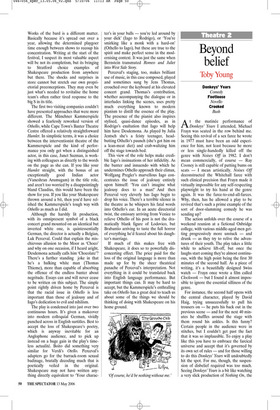Shaken or stirred?
Patrick Carnegy Othello Royal Shakespeare Theatre, Stratford-upon-Avon Hamlet Swan Theatre, Stratford-upon-Avon Completism has become a maddening obsession these days with the BBC’s Radio Three. Every crotchet of Beethoven given in a week, every demisemiquaver of Webern encompassed within hours, two weeks of wall-to-wall Bach before Christmas, and, most recently, Wagner’s Ring spun into a single day. What’s wrong is that good music craves total attention. Not even St Cecilia can manage that for longer than a couple of hours at a stretch.
The RSC’s festival of the Complete Works of the bard is a different matter. Basically because it’s spread out over a year, allowing the determined playgoer time enough between shows to recoup his concentration. Writing at the start of the festival, I suspect its most valuable aspect will be not its completism, but its bringing to Stratford choice examples of Shakespeare production from anywhere but there. The shocks and surprises in store cannot but stretch our own proprietorial preconceptions. They may even be just what’s needed to revitalise the home team’s often rather tired response to the big S in its title.
The first two visiting companies couldn’t have presented approaches that were more different. The Münchner Kammerspiele showed a fearlessly reworked version of Othello, while Cape Town’s Baxter Theatre Centre offered a relatively straightforward Hamlet. In simplistic terms, it was a choice between the interventionist theatre of the Kammerspiele and the kind of performance you only get when a distinguished actor, in this case, Janet Suzman, is working with colleagues as directly to the words on the page as she can. If you like your Hamlet straight, with the bonus of an exceptionally good Indian actor (Vaneshran Arumugam) in the title role, and aren’t too worried by a disappointingly bland Claudius, this would have been the show for you. If you like your Shakespeare thrown around a bit, then you’d have relished the Kammerspiele’s tough way with Othello as much as I did.
Although the harshly lit production, with its omnipresent symbol of a black concert grand mounted on an identical but inverted white one, is quintessentially German, the director is actually a Belgian, Luk Perceval. Could that explain the mischievous allusion to the Moor as ‘Choco’ and why on one occasion, if I heard aright, Desdemona actually calls him ‘Chocolate’? There’s a further standing joke in that he’s a hulking white man (Thomas Thieme), more than capable of absorbing the offence of the endless banter about negritude. Essays can and will never cease to be written on this subject. The simple point rightly driven home by Perceval is that the racial issue in Othello is less important than those of jealousy and of Iago’s dedication to evil and nihilism.
The play is condensed into just over two continuous hours. It’s given a makeover into modern colloquial German, vividly punched across in English surtitles. Best to accept the loss of Shakespeare’s poetry, which is anyway inevitable for an Anglophone audience, and to pick up instead on a huge gain in the play’s timeless actualité. Boito did something very similar for Verdi’s Otello. Perceval’s adapters go for the barrack-room sexual badinage, brutally decoding much that is poetically veiled in the original. Shakespeare may not have written anything directly equivalent to ‘Your charac ter’s in your balls — you’re led around by your dick’ (Iago to Rodrigo), or ‘You’re smirking like a monk with a hard-on’ (Othello to Iago), but these are true to the spirit and make perfect sense in the modernising context. It was just the same when Bernstein transmuted Romeo and Juliet into West Side Story.
Perceval’s staging, too, makes brilliant use of music, in this case composed, played and sometimes sung by Jens Thomas, crouched over the keyboard at his elevated concert grand. Thomas’s contribution, whether accompanying the dialogue or in interludes linking the scenes, uses pretty much everything known to modern pianism to distill the essence of the play. The presence of the pianist also inspires stylised, quasi-dance episodes, as in Rodrigo’s exultation that Iago will help him have Desdemona. As played by Julia Jentsch she’s a feisty teenager, headbutting Othello’s paunch (she’s got him on a lean-meat diet) and crab-waltzing him off the stage towards bed.
This view of the role helps make credible Iago’s insinuations of her infidelity. As the banter and innuendo with which he undermines Othello approach their climax, Wolfgang Pregler’s marvellous Iago concentrates the issue of jealousy entirely upon himself: ‘You can’t imagine what jealousy does to a man!’ And then Perceval very cleverly has Iago begin to drop his voice. There’s a terrible silence in the theatre as he whispers his fatal words into Othello’s ear. In an acute directorial twist, the emissary arriving from Venice to relieve Othello of his post is not the dramatically blank figure of Lodovico, but Brabantio arriving to taste the full horror of everything he’d feared about his daughter’s marriage.
If much of this makes free with Shakespeare, it does so to powerfully disconcerting effect. The price paid for the loss of the original language is more than made up for by the sheer theatrical panache of Perceval’s interpretation. Not everything in it could be translated back into English language performance. But important things can. It may be hard to accept, but the Kammerspiele’s enthralling take on Othello has a great deal to teach us about some of the things we should be thinking of doing with Shakespeare on his home ground.











































































 Previous page
Previous page